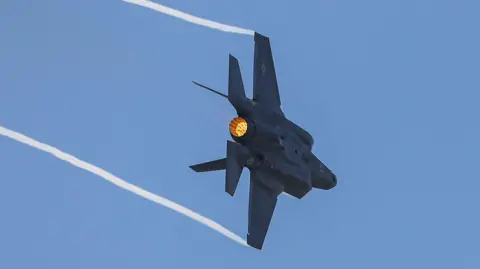UK F-35 parts exports to Israel are lawful, High Court rules
 NurPhoto via Getty Images
NurPhoto via Getty ImagesThe UK's High Court has rejected a case brought by campaigners trying to stop the transfer to Israel of all British-made spare parts for US-produced F-35 fighter jets, saying it didn't have the constitutional authority to intervene.
The government suspended about 30 arms export licences to Israel last September because of a risk of UK-made weapons being used in violations of international law in the Gaza Strip.
But the UK supplies components to a global pool of F-35s which Israel can access. The government had argued it could not pull out of the defence programme without endangering international peace.
Amnesty International and Human Rights Watch expressed their dismay at the ruling.
Both groups had intervened in the case.
"The horrifying reality in Gaza is unfolding in full view of the world: entire families obliterated, civilians killed in so-called safe zones, hospitals reduced to rubble, and a population driven into starvation by a cruel blockade and forced displacement," said Sacha Deshmukh, chief executive of Amnesty International UK.
"This judgment does not change the facts on the ground, nor does it absolve the UK government of its responsibilities under international law."
The two judges said the case was not about whether the UK should supply arms and other military equipment to Israel - because the government had decided it should not.
They were being asked to decide on a particular issue: whether the UK "must withdraw from a specific multilateral defence collaboration" because of the prospect that some UK-manufactured parts may be supplied to Israel and used in contravention of international law in the conflict in Gaza.
"Under our constitution, that acutely sensitive and political issue is a matter for the executive which is democratically accountable to parliament and ultimately to the electorate, not for the courts," they ruled.
UK industry makes 15% of every F-35, according to the Campaign Against the Arms Trade.
Oxfam, which provided evidence to the court, said: "It is unconscionable that the government would continue to license the sale of components for F-35 jets knowing that they are used to deliberately attack civilians in Gaza and destroy their means of survival, including vital water supplies."
The case was brought by al-Haq, a group based in the Israel-occupied West Bank, and the Global Legal Action Network against the Department for Business and Trade.
The court said that Business Minister Jonathan Reynolds was "faced with the blunt choice of accepting the F-35 carve out or withdrawing from the F-35 programme and accepting all the defence and diplomatic consequences which would ensue".
The government also argued pulling out of the defence programme could undermine US confidence in the UK and Nato.
But human rights groups argue that the global rule of law is under threat over Gaza.
"The atrocities we are witnessing in Gaza are precisely because governments don't think the rules should apply to them," said Yasmine Ahmed, UK director of Human Rights Watch.
"Judicial deference to the executive in this case has left the Palestinians in Gaza without access to the protections of international law, despite the government and the court acknowledging that there is a serious risk that UK equipment might be used to facilitate or carry out atrocities against them."
The government says it will continue to keep its defence export licensing under review.
"The court has upheld this government's thorough and lawful decision-making on this matter," a spokesman said.
Lawyers for the human rights groups are considering if they can find grounds to appeal.
